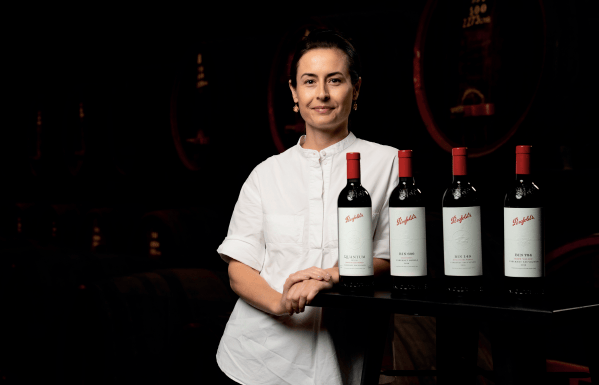
BAZAAR engages in an intimate conversation about the art of wine with Penfolds country of origin group winemaker, Steph Dutton.
A renowned name in the world of wines, Penfolds have a resounding history of creating wines that stand the test of time and always impress at the dinner table. Having the opportunity to speak to country of origin group winemaker, Steph Dutton, she shares her personal experience as a female winemaker, Penfolds stance on sustainability and what makes Penfolds wines so special.
Can you walk us through a typical day as a Penfolds winemaker?
SD: I think part of the appeal of this industry is that there is no typical day in the life. But during the vintage period that’s between February and even into May is where I’ll see a more clearer routine. I will say that most mornings are actually spent out in the vineyard, it can be quite warm in Australia that time of year so getting out early into vineyards to walk the rows and see what is coming in or what is developing in terms of ripeness is really important. Then it’s probably by lunch time you’re back in the winery. Once you’re back in the winery you’re doing a tasting round, we would look at probably two hundred wines a day and they’re really important check-ins to see how something is progressing. You can have all the analysis in the world, you can have all the technology in the world but the human palette is still proving itself to be the most useful tool when you’re making wine.
Penfolds adheres to time-honoured methods, yet there’s a contemplation on the extent to which to embrace technology. How has Penfolds embraced the use of technology in their wine making process?
SD: A couple of years ago we spent 165 million dollars on winery infrastructure for making better wine and the idea behind that is that you free up the winemakers to be making decisions about wine rather than doing the labour, and so for me I actually think in recent years we’ve leaned into the technology in a big way. Nowadays we’re using technology via satellite imagery, soil moisture mapping, all those sorts of things. So when it comes to style, we’re pretty traditional but when it comes to technology I think we’re very good at leaning into it.
What are some ways Penfolds are integrating strategies in regard to sustainability?
SD: We talk about climate change, we talk about rising temperatures, but water usage is a really important thing to be responsible for—especially in regards to sustainability. Any wasted water from the winery is now spread into our vineyard and even to local golf courses and we’ve got new technology where water preservation is actually being increased 30%. Sustainability encompasses aspects that aren’t easily quantifiable, but there are tangible measures. A crucial milestone for us is that, by the end of next year (2024), our wine production will be powered by 100% renewable energy in the winery. We have achieved this through the establishment of the largest solar winery plant, situated over our car park, which is responsible for helping us reach our goal in 2024. Additionally, by 2030, our entire business will be carbon neutral. These are the goals and targets that we have set for ourselves.
You’ve been with Penfolds for more than a decade, do you think fine wine has changed over the years?
SD: Once upon a time I think that fine wine used to be very unapproachable in its youth and one of the things that i’ve seen in Penfolds wine making over my 16 years is we will never waver from ageability. So how can we from a wine making point of view and perspective still go for longevity and still go for something a bit glossier and softer on release—that has been a big change in my perspective of fine wine.
In such a male dominated field, how has it been like navigating the world of winemaking as a woman?
SD: I am so lucky that it has been a positive experience for me but I always say to people just because it has been a positive experience for me don’t assume it has been a positive experience for everybody. The biggest propionates for change or equality in the industry, quite often look to the females to be those agents of change but do bring males on the journey with you because I look at every single opportunity that has been created for me and I’ve had the backing of a male colleague, they have been such beautiful sponsors for me in the industries.
What has been your favourite wine to create at Penfolds?
SD: I’m going to choose two. 2010 was my very first vintage with the Penfolds red wine making team, and in 2010, it was an incredibly strong vintage and crafting. Being a part of the team that crafted the 2010 Penfolds Grange was one of the most rewarding experiences. I think the 2018 is right up there with the 2010, it reminded me that for an industry that relies on mother nature, you can’t take any of them for granted.
Alisha Azuddin
The Beauty Director at Harper’s BAZAAR Malaysia, Alisha first set her sights on a career in sports journalism before pivoting to beauty during her university years—and she’s stayed in that lane ever since. While her love for sports remains strong (these days, purely from the stands), she’s found her true calling in the beauty and wellness space. Equal parts storyteller and trend spotter, she believes that a good lip combo and a great skincare routine can change more than just your mood.



